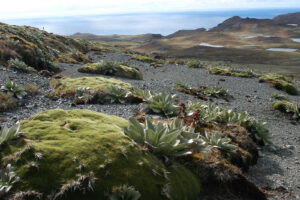Physical Address
23,24,25 & 26, 2nd Floor, Software Technology Park India, Opp: Garware Stadium,MIDC, Chikalthana, Aurangabad, Maharashtra – 431001 India
Physical Address
23,24,25 & 26, 2nd Floor, Software Technology Park India, Opp: Garware Stadium,MIDC, Chikalthana, Aurangabad, Maharashtra – 431001 India

A recent study published in the journal Nature Geoscience has found that Antarctica is ‘greening’ at a rapid pace in response to an increasingly warming world. While we know a lot about how the ice is changing, not much is known about how moss and other land plants are getting affected, which this crucial study based on analysis of Landsat images has addressed.
Using satellite images from 1986 to 2021, researchers from the universities of Exeter and Hertfordshire, and the British Antarctic Survey found that the land covered by plants in the region has grown almost tenfold in the period. They found that in 1986, it was only 0.863 square kilometers, but by 2021, it had expanded to 11.947 square kilometers.
The researchers also found that the rate of plant growth has been speeding up more in recent years since 2016, with the greening trend accelerating by over 30% in recent years (2016-2021) in comparison to the full study period.
A previous study showed that plant growth in moss-dominated areas of the Antarctic Peninsula had increased significantly in recent decades. This new study, using satellite images, confirms that this greening is widespread and speeding up across the Peninsula.
Dr Thomas Roland, from the University of Exeter, UK, who co-led the study said, “The plants we find on the Antarctic Peninsula – mostly mosses – grow in perhaps the harshest conditions on Earth. The landscape is still almost entirely dominated by snow, ice and rock, with only a tiny fraction colonised by plant life. But that tiny fraction has grown dramatically – showing that even this vast and isolated ‘wilderness’ is being affected by anthropogenic climate change.”
The fact that plants are growing more on a continent mostly covered in ice and bare rock shows how far global warming is affecting Antarctica, an area which is warming up faster than the rest of the world. Researchers engaged in the study expressed concern that this increasing plant growth could make it easier for invasive species (plants or animals not native to Antarctica) to enter and disrupt the untouched Antarctic ecosystem.
Dr Olly Bartlett, from the University of Hertfordshire, said, “As these ecosystems become more established – and the climate continues to warm – it’s likely that the extent of greening will increase. Soil in Antarctica is mostly poor or non-existent, but this increase in plant life will add organic matter, and facilitate soil formation – potentially paving the way for other plants to grow. This raises the risk of non-native and invasive species arriving, possibly carried by eco-tourists, scientists or other visitors to the continent.”
The researchers are studying how plants begin to grow in areas where glaciers have recently melted and exposed the land. They are also trying to understand how this process of plant colonization might continue in the future as more ice melts due to warming.
“The sensitivity of the Antarctic Peninsula’s vegetation to climate change is now clear and, under future anthropogenic warming, we could see fundamental changes to the biology and landscape of this iconic and vulnerable region. Our findings raise serious concerns about the environmental future of the Antarctic Peninsula, and of the continent as a whole. In order to protect Antarctic,” Dr Ronald added.
References:
https://www.nature.com/articles/s41561-024-01564-5
https://news-archive.exeter.ac.uk/featurednews/title_583908_en.html
https://experts.exeter.ac.uk/23585-tom-roland
Antarctic ‘greening’ at dramatic rate
https://researchprofiles.herts.ac.uk/en/persons/olly-bartlett
Banner image: https://www.antarctica.gov.au/site/assets/files/68357/rs34198.1600×0.jpg